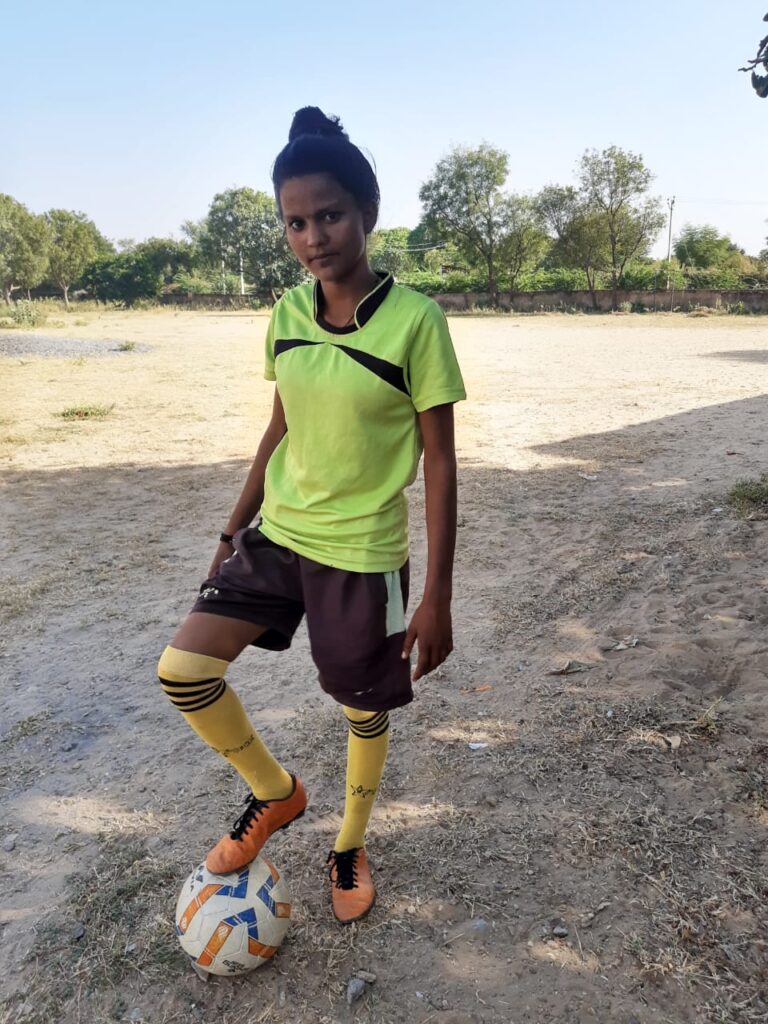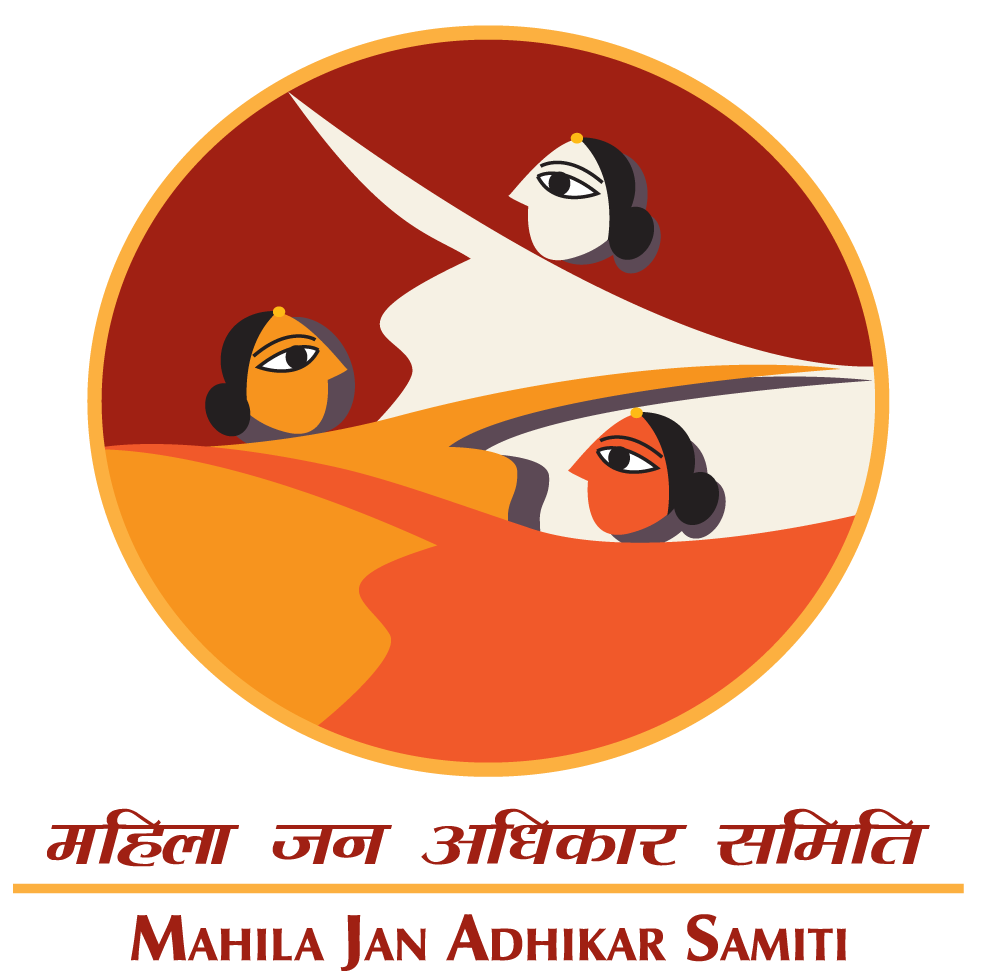Dhoniya Harijan (Football Player) –Hasiyawas

Dhoniya Harijan is a sixteen-year-old girl from the village of Hansiyawas, in Ajmer district in Rajasthan.She started playing football in 2017, when she joined Mahila Jan Adhikar Samiti (MJAS) in their football programme. Dhoniya is a Dalit, and was outcasted in her school as well as in the larger community. But football helped her gain confidence and challenge the Social barriers that had outcasted her.
When she was a young child, Dhoniya lost both her parents. Her older brother and uncle have brought her up since. In order to make ends meet, Dhoniya used to go from house to house in the village to collect food for her family. While growing up, she used to watch the upper caste children play cricket or hopscotch –but the rigid social norms in the community meant that she could not join in the fun. Like any young child, Dhoniya also had dreams – she wanted to play outdoors, make new friends and experience the joys of childhood. Before MJAS’s football programme, which started in Hansiyawas in 2016, no one in the village played football. Due to patriarchal norms, girls were not allowed to go outside and play, once they hit puberty. Instead,they were required to stay home and help their mothers with the household chores. Add to this the fact that Dhoniya was a Dalit, an untouchable, and the chances of her fulfilling her ambitions of playing Seemed slim. Things changed when MJAS decided to start a football programme for the girls in the village. They held meetings with the community, inviting parents,teachers, guardians and local leaders to the village school, to convince them to let girls participate in football, and to clear up any qualms the community may have. While the community was initially hesitant, MJAS persisted, approaching the women of the community – they reasoned that while the older women did not get an opportunity to study and play, their daughters should not suffer the same fate. Once the community was convinced, girls started coming out of their homes to play football.
Dhoniya assumed that she may be unable to join the football programme because she was an untouchable– she would watch the other girls play football, train with their coach and spend time together enjoying themselves with their new friends. But after some time of just watching them, Dhoniya mustered the courage to talk to the coordinators at MJAS, who encouraged her to join their football programme, and welcomed her Warmly.
Dhoniya was unsure how she would be welcomed by the rest of the girls who were participating in the programme. However, MJAS’s programme ensures that along with football, girls also learn about various social norms which are harmful, and to challenge such ways of thinking which are reductive. The girls welcomed her too, and accepted her for who she was. Dhoniya was happy to be part of a peer group who she could play with and talk to.
At MJAS’s football programme, girls between the ages of 11 and 20 years would be trained every summer and winter vacation, initially. Then, as the programme gained credibility in the community, they extended it to regular weekly sessions, where the girls, including Dhoniya, played every evening. MJAS were also able to get a football coach to train the girls a few days a week. Further, the girls started to get access to training from certified coaches of the district football association during the periodic camps they participated in. Along with the training,MJAS provided the girls with football equipment, shoes and jerseys. However, the football facilities in the village remained below par – the ground was uneven surrounded by thorny bushes, with no access to goalposts – bricks would be used as a substitute. Moreover, there was no permanency to the ground, as it would be occupied for various village festivities at different times during the year.
Along with the football training, the girls were also given lessons in nutrition, benefits of physical exercise and self-defense. Moreover, MJAS built the girls’ capacities on crucial topics including child sexual abuse, gender norms and gender-based discrimination, and casteism. Dhoniya and the girls also learnt about child, early and forced marriages, a tradition that is highly prevalent in her community.MJAS taught the girls about their rights as children and the laws around child marriage, as well as how to assert these rights.
In 2018, Dhoniya’s brother and uncle wanted her to get married. Aata saatais an exchange marriage concept,common in her community, where brothers and sisters get married into the same family. Her brother wanted Dhoniya to marry his brother-in-law. But putting her learning to practice, she refused to get married. While talking to her brother, she asserted: “I don’t want to get married as a child. I want to play football. If you keep pressuring me to get married, I will call Padma didi [from MJAS] who will call the police.”
“I don’t want to get married as a child.
I want to play football.
-Dhoniya
“ Her brother and uncle dropped the matter, surprised to see how confident and assertive Dhoniya had become.Dhoniya had always had low self-esteem and no confidence in herself, but seeing this change in her was amazing. After this incident, they would also go to watch her play football, impressed with her skills and how much she had learnt.
Watching her play convinced them that she did not need to get married yet, that sheshould continue studying, and that there was more to her life than getting married.
MJAS also gave Dhoniya exposure beyond her village and her life in it. MJAS took herand her football team to Ajmer for a training camp in 2017. It was her first time going to a big city and playing in a proper football ground. Her experience there was life- changing, as she gained the confidence to play well and to mingle and make friends with girls from different villages. While earlier she would have been afraid of the repercussions of doing so because of her caste, she knows that such social constructs are wrong and should be challenged. In February 2020, Dhoniya and her team participated in a football tournament organised by the Western Railways in Ajmer city. Dhoniya’s team made it to the finals, where their team went against that of Kishangarh school. After a riveting match, Dhoniya and her team won the tournament. They brought the winner’s trophy back home to Hansiyawas, it was a moment of pride for everyone in the village. The community was thrilled by the achievement of the girls, their daughters. Dhoniya’s own family was very proud of her, and glad that they chose to support her football journey. For Dhoniya, this remains the highlight of her football career, so far – she has a long future ahead of her, and she is excited to see what life brings her way.
